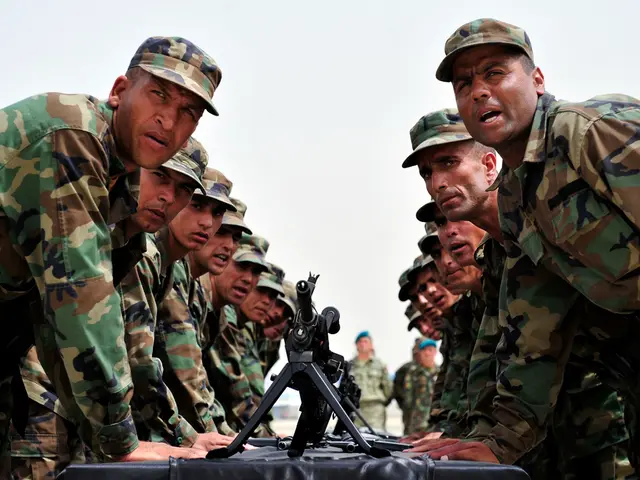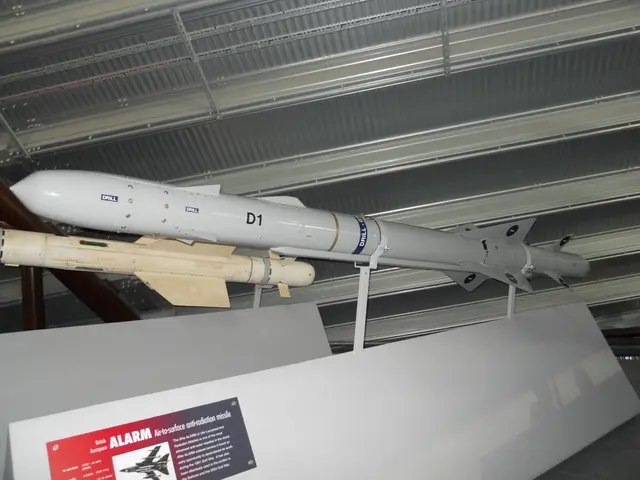Mighty Showings of J-10C in Combat? Silence from Beijing Amidst Echoes of Fighter Jet Triumphs in China
In a striking turn of events, Pakistan made a claim that it has scored the first combat victory of the J-10 family, with the advanced J-10C. Being the sole foreign nation operating this advanced fighter jet, Pakistan has a fleet of 20. Remarkably, this skirmish also recorded the first reported loss of a Rafale fighter jet in combat.
Despite the intense exchanges, the Chinese government and its media have stayed eerily silent. However, on a Thomson Reuters Foundation call, the foreign ministry spokesman, Lin Jian, admitted that he was "not familiar" with reports linking Chinese jets to the India-Pakistan conflict. On a separate occasion, the ministry did issue a statement, urging both nations to demonstrate restraint to prevent the situation from escalating further.
This unusually measured response from China can be traced back to several geopolitical factors.
Pakistan: A Tool in China's Geopolitical Arsenal
China has a longstanding strategic alliance with Pakistan, often referred to as an "ironclad friendship." Being Pakistan's main supplier of arms, with over 80% of Pakistan's defense imports originating from China, China's military support serves to bolster Pakistan's defense capabilities vis-à-vis India. China's economic investments in Pakistan through projects like the Belt and Road Initiative, valued at approximately $28 billion, also play a significant role in China's commitment to the region.
India: A Thorn in China's Side
The India-China relationship is fraught with tension, with ongoing border disputes and economic competition being key drivers. China's support for Pakistan can be seen as a strategic move to counterbalance India's influence in the region. Neighboring India, China's actions can significantly impact regional stability and India's security perceptions.
The Greater Implications
This volatile region could see an indirect impact on regional stability and global security. While China's dual approach prevents an all-out conflict, it maintains tension that serves China's strategic interests. International pressure might also mount, with global powers seeking to stabilize the region and potentially curb China's geopolitical influences. The conflict could also have far-reaching economic implications, potentially affecting trade routes and economic growth in the region.
In summary, China's position in the India-Pakistan conflict is complex:- Supporting Pakistan: Enhancing Pakistan's military capabilities and providing strategic backing.- Counterbalancing India: Using its influence to counterbalance India's regional leadership.- Preserving Regional Stability: Seeking to avoid an all-out conflict while advancing Chinese interests.
Overall, China is deftly navigating this tense situation to maintain regional stability and advance its strategic objectives.
- China's strategic alliance with Pakistan, often referred to as an "ironclad friendship," has been strengthened by China's role as Pakistan's main supplier of arms, with over 80% of Pakistan's defense imports originating from China.
- Despite remaining relatively quiet about the Indo-Pakistan conflict, China has been using its financial influence, investing approximately $28 billion in Pakistan through projects like the Belt and Road Initiative.
- In a sensitive diplomatic game, China's support for Pakistan can be seen as a strategic move to counterbalance India's influence in the region, leveraging its military and economic power to maintain regional stability.
- The aerospace industry is another aspect where China's influence is growing, as Pakistan operates the advanced J-10C fighter jet, making it the sole foreign nation to do so.
- As global powers seek to stabilize the region and potentially curb China's geopolitical influences, the Indo-Pakistan conflict could have far-reaching economic implications for the aerospace, finance, and industry sectors.








